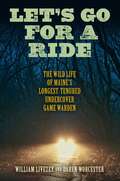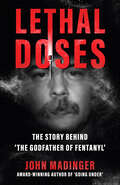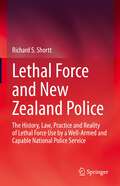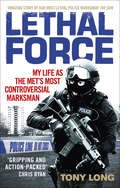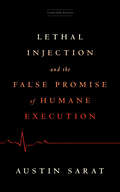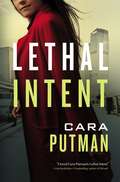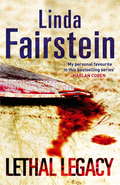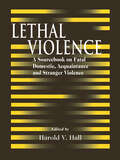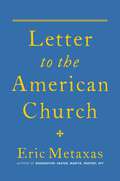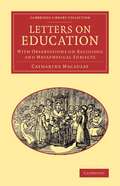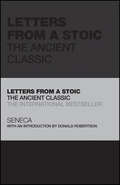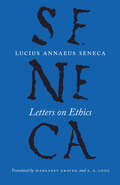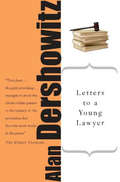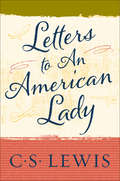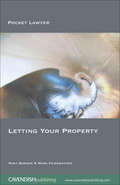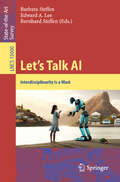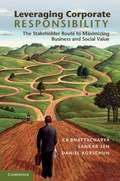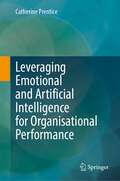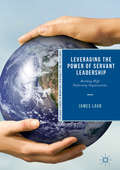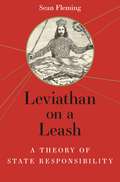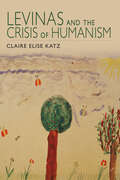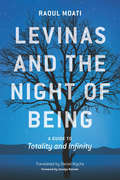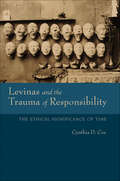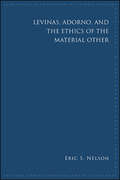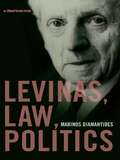- Table View
- List View
Let's Go for a Ride: The Wild Life of Maine's Longest-Tenured Undercover Game Warden
by William LivezeyLet&’s Go for a Ride is the story of William (Bill) Livezey&’s thirty-year career in the Maine Warden Service. Heralded as &“one of the best covert investigators in the country&” by Maine Warden Service Lieutenant Dan Scott, Bill is the agency&’s longest-tenured undercover operative, having spent twenty years in the Special Investigations Unit.&“Let&’s go for a ride&” is the universal bad-guy code for breaking the law. Among Maine&’s most sinister wildlife offenders, its utterance is prone to incite alcohol-fueled night hunting, high-speed car chases on winding country roads, drug dealing, arson, and attempted murder. The worst of the worst were Bill Livezey&’s bread and butter.His success at putting the truly bad guys out of business was driven by his upbringing as one of them. Born and raised in Pennsylvania, Bill's father was a successful businessman whose blind ambition sent him down the dark path of drug trafficking. It wasn&’t long before young Bill was tagging along and doing drugs with his dad. The aftermath of witnessing his father perish in a fiery standoff with police sent Bill spiraling out of control. He lashed out at law enforcement by dealing drugs, and he numbed the pain and confusion by doing them. Deep down, Bill knew his life was broken. When a high school football teammate invited him to attend a Fellowship of Christian Athletes meeting, he discovered his faith and a new path.
Lethal Doses: The Story Behind "The Godfather Of Fentanyl"
by John MadingerOn a cold afternoon in February 1991, a frightening new drug hit the streets of New York City, a synthetic narcotic marketed in packets labeled “Tango & Cash.” As police scrambled to warn heroin users of the danger, the overdose victims began piling up in hospital emergency rooms and county morgues across three states. As a Drug Enforcement Administration agent said at the time, “We don’t know yet who’s putting this stuff out there, but whoever he is, he’s an ice-cold son of a bitch.” Fentanyl had come to America. In 2024, fentanyl is killing nearly 200 Americans every day, and not just heroin users, a seemingly unstoppable narcotic curse like none ever seen before. But few know that this plague began in the brilliant mind of the high-school dropout and chemistry prodigy that the DEA called “the best and most dangerous clandestine chemist” it has ever encountered. The clandestine chemist was George Erik Marquardt. Starting at just twelve years old, Marquardt used his extraordinary talents to make every illegal drug in the book, from bootleg booze to heroin. He brewed LSD for Timothy Leary and the Grateful Dead, methamphetamine for outlaw motorcycle gangs, nerve gas for Idaho Nazis, and even life-saving AZT for AIDS patients. But when that ice-cold son of a bitch turned to fentanyl, thousands of Americans would die. In LETHAL DOSES: The Story Behind ‘The Godfather of Fentanyl,’ award-winning author and former undercover agent for the Oklahoma Bureau of Narcotics John Madinger, tells the remarkable story of DEA’s three-year pursuit, the genesis of our fentanyl problem today, and the uniquely dangerous evil genius he spent hundreds of hours interviewing. Now you can read the incredible book on which the hit docuseries, THE GODFATHER OF FENTANYL, is based!
Lethal Force and New Zealand Police: The History, Law, Practice and Reality of Lethal Force Use by a Well-Armed and Capable National Police Service
by Richard S. ShorttThis book challenges the notion that the New Zealand Police are one of only four global police services that does not have routinely armed officers, using arguments and facts drawn from 2000 to 2019, a period of important change for the organisation and its relationship with firearms, particularly following the outrages of the Christchurch mosques terrorist massacres in 2019, and the 2020 shooting death of a young police constable in Aotearoa New Zealand. This book provides a brief history of the Police from its beginnings to the present day with a specific focus on its relationship with firearms, which contextualize the law that justifies use of lethal force in a country that has abolished the death penalty. It examines police policies, procedures, training and structures governing deployment and use of firearms in Aotearoa New Zealand, and the independent oversight that now applies to fatal and non-fatal shootings by Police. Using 43 publicly released oversight agency reports and data directly related to police shootings, such as who is being shot, this book investigates how the police are using lethal force, who is being affected, and what this might mean for the service with regards to the operational deployment of firearms and the potential for use of lethal force within the community into the future.
Lethal Force: My Life As the Met’s Most Controversial Marksman
by Tony LongTony Long was the best ‘shot’ the Met ever had. Under the codename ‘Echo 7’, he was ‘licenced to kill’ bringing down scores of targets, sometimes with deadly force. In 1985 he opened fire on a suspect to save a four-year-old girl whose mother had been stabbed to death by her assailant. Two years later he was involved in another high profile shooting while confronting three armed criminals. On both occasions Tony was commended by the Metropolitan Police Commissioner. But in the spring of 2005, coming face to face with suspected drug dealer and armed robber Azelle Rodney, a volley of point blank shots would bring his career crashing to an end, tarnish his reputation and leave him fighting a murder charge and possible life sentence. From life or death cases and botched operations to political fallouts, this book charts the controversial career from rookie seventies beat cop to Long's command of SO19 – the Met’s most elite specialist firearms unit. Long’s personal testimony and professional insight raises serious issues about the duties, pressures and responsibilities that fall on the shoulders of those we task to risk their lives, and take the lives of others, in our name.
Lethal Injection and the False Promise of Humane Execution
by Austin SaratWith a history marked by incompetence, political maneuvering, and secrecy, America's "most humane" execution method is anything but. From the beginning of the Republic, this country has struggled to reconcile its use of capital punishment with the Constitution's prohibition of cruel punishment. Death penalty proponents argue both that it is justifiable as a response to particularly heinous crimes, and that it serves to deter others from committing them in the future. However, since the earliest executions, abolitionists have fought against this state-sanctioned killing, arguing, among other things, that the methods of execution have frequently been just as gruesome as the crimes meriting their use. Lethal injection was first introduced in order to quell such objections, but, as Austin Sarat shows in this brief history, its supporters' commitment to painless and humane death has never been certain. This book tells the story of lethal injection's earliest iterations in the United States, starting with New York state's rejection of that execution method almost a century and half ago. Sarat recounts lethal injection's return in the late 1970s, and offers novel and insightful scrutiny of the new drug protocols that went into effect between 2010 and 2020. Drawing on rare data, he makes the case that lethal injections during this time only became more unreliable, inefficient, and more frequently botched. Beyond his stirring narrative history, Sarat mounts a comprehensive condemnation of the state-level maneuvering in response to such mishaps, whereby death penalty states adopted secrecy statutes and adjusted their execution protocols to make it harder to identify and observe lethal injection's flaws. What was once touted as America's most humane execution method is now its most unreliable one. What was once a model of efficiency in the grim business of state killing is now marked by mayhem. The book concludes by critically examining the place of lethal injection, and the death penalty writ large, today.
Lethal Intent
by Cara C. PutmanIf they expected silence, they hired the wrong woman. Caroline Bragg&’s life has never been better. She and Brandon Lancaster are taking their relationship to the next level, and she has a new dream job as legal counsel for Praecursoria—a research lab that is making waves with its cutting-edge genetic therapies. The company&’s leukemia treatments even promise to save desperately sick kids—kids like eleven-year-old Bethany, a critically ill foster child at Brandon&’s foster home. When Caroline&’s enthusiastic boss wants to enroll Bethany in experimental trials prematurely, Caroline objects, putting her at odds with her colleagues. They claim the only goal at Praecursoria is to save lives. But does someone have another agenda? Brandon faces his own crisis. As laws governing foster homes shift, he&’s on the brink of losing the group home he&’s worked so hard to build. When Caroline learns he&’s a Praecursoria investor, it becomes legally impossible to confide in him. Will the secrets she keeps become a wedge that separates them forever? And can she save Bethany from the very treatments designed to heal her? This latest romantic legal thriller by bestseller Cara Putman shines a light on the shadowy world of scientific secrets and corporate vendettas—and the ethical dilemmas that plague the place where science and commerce meet.&“Intriguing characters. Romantic tension. Edge-of-your-seat suspense. And a fast-paced ending that will leave you exhausted (in a good way!).&” —Robert Whitlow, award-winning author of Promised Land
Lethal Legacy (Alexandra Cooper #11)
by Linda FairsteinWhen Assistant District Attorney Alexandra Cooper is summoned to Tina Barr's apartment on Manhattan's Upper East Side, she finds a neighbour convinced that the young woman has been assaulted. But the terrified victim, a conservator of rare books and maps, denies that and refuses to co-operate with Alex and the police investigators. Tina disappears, and then another woman is found murdered in the same apartment, with an extremely valuable book at her side. The book has probably been stolen, but from whom and how? Pursuing the murderer Alex is drawn into the strange and privileged world of rich and secretive book collectors, where avarice and greed is as strong an inheritance as wealth..In a beguiling mix and history and suspense Linda Fairstein takes readers on a breath-taking ride through collections of beautiful first editions, supposedly 'lost' atlases, and deep into the hidden rooms and tunnels of the great New York Public Library.
Lethal Violence: A Sourcebook on Fatal Domestic, Acquaintance and Stranger Violence
by Harold V. HallLethal Violence: A Sourcebook on Fatal Domestic, Acquaintance and Stranger Aggression applies the lethal violence sequence analysis to a wide-ranging array of fatal aggression, resulting in a multitude of observations and principles of violence. This sourcebook provides base rate information and cases for each type of fatal interaction, then applies the knowledge to violence-related situations and settings.
Letter to the American Church
by Eric MetaxasIn an earnest and searing wake-up call, the author of the bestseller Bonhoeffer: Pastor, Martyr, Prophet, Spy warns of the haunting similarities between today&’s American church and the German church of the 1930s. Echoing Bonhoeffer&’s prophetic call, Eric Metaxas exhorts his fellow Christians to repent of their silence in the face of evil before it is too late.
Letters On Education: With Observations On Religious And Metaphysical Subjects (Cambridge Library Collection)
by Catharine MacaulayFirst published in 1790, this collection of letters presents the mature views of Catharine Macaulay (1731-91) on education and related topics. Famed as an impassioned writer on history and politics, she defied eighteenth-century preconceptions of what it was possible and appropriate for women to achieve. Ranging across a broad spectrum of subjects, from diet and reading to pastimes, religion and discipline, this work reflects her enlightened thinking. She compares the educational situation in England to the contemporary French and American systems, and even those of ancient Rome and Sparta. Championing equality in education regardless of gender, Macaulay argues for the instruction of girls within a co-educational system, seeing this as the only way to improve female standing in society. Also reissued in this series is her eight-volume History of England (1763-83), which traces the upheavals of the seventeenth century.
Letters from a Stoic: The Ancient Classic (Capstone Classics)
by Seneca Donald RobertsonDISCOVER THE ENDURING LEGACY OF ANCIENT STOICISM Since Roman antiquity, Lucius Annaeus Seneca&’s Letters have been one of the greatest expressions of Stoic philosophy. In a highly accessible and timeless way, Seneca reveals the importance of cultivating virtue and the fleeting nature of time, and how being clear sighted about death allows us to live a life of meaning and contentment. Letters from a Stoic continues to fascinate and inspire new generations of readers, including those interested in mindfulness and psychological techniques for well-being. This deluxe hardback selected edition includes Seneca&’s first 65 letters from the Richard M. Gummere translation. An insightful introduction by Donald Robertson traces Seneca&’s busy life at the centre of Roman power, explores how he reconciled his Stoic outlook with vast personal wealth, and highlights Seneca&’s relevance for the modern reader.
Letters on Ethics: To Lucilius (The Complete Works of Lucius Annaeus Seneca)
by Lucius Annaeus Seneca A. A. Long Margaret GraverThe Roman statesman and philosopher Seneca (4 BCE-65 CE) recorded his moral philosophy and reflections on life as a highly original kind of correspondence. Letters on Ethics includes vivid descriptions of town and country life in Nero's Italy, discussions of poetry and oratory, and philosophical training for Seneca's friend Lucilius. This volume, the first complete English translation in nearly a century, makes the Letters more accessible than ever before. Written as much for a general audience as for Lucilius, these engaging letters offer advice on how to deal with everything from nosy neighbors to sickness, pain, and death. Seneca uses the informal format of the letter to present the central ideas of Stoicism, for centuries the most influential philosophical system in the Mediterranean world. His lively and at times humorous expositions have made the Letters his most popular work and an enduring classic. Including an introduction and explanatory notes by Margaret Graver and A. A. Long, this authoritative edition will captivate a new generation of readers.
Letters to a Young Lawyer
by Alan M. DershowitzAs defender of both the righteous and the questionable, Alan Dershowitz has become perhaps the most famous and outspoken attorney in the land. Whether or not they agree with his legal tactics, most people would agree that he possesses a powerful and profound sense of justice. In this meditation on his profession, Dershowitz writes about life, law, and the opportunities that young lawyers have to do good and do well at the same time.We live in an age of growing dissatisfaction with law as a career, which ironically comes at a time of unprecedented wealth for many lawyers. Dershowitz addresses this paradox, as well as the uncomfortable reality of working hard for clients who are often without many redeeming qualities. He writes about the lure of money, fame, and power, as well as about the seduction of success. In the process, he conveys some of the "tricks of the trade" that have helped him win cases and become successful at the art and practice of "lawyering."
Letters to an American Lady
by C. S. LewisOn October 26, 1950, C. S. Lewis wrote the first of more than a hundred letters he would send to a woman he had never met, but with whom he was to maintain a correspondence for the rest of his life.Ranging broadly in subject matter, the letters discuss topics as profound as the love of God and as frivolous as preferences in cats. Lewis himself clearly had no idea that these letters would ever see publication, but they reveal facets of his character little known even to devoted readers of his fantasy and scholarly writings—a man patiently offering encouragement and guidance to another Christian through the day-to-day joys and sorrows of ordinary life.Letters to an American Lady stands as a fascinating and moving testimony to the remarkable humanity and even more remarkable Christianity of C. S. Lewis, and is richly deserving of the position it now takes among the balance of his Christian writings.
Letting Your Property (Pocket Lawyer)
by Mark Fairweather Rosy BorderIf you are thinking of renting out a house or flat, this book will give you everything you need to become a successful landlord. It advises you about your legal responsibilities, about choosing and vetting a tenant and about the tenancy agreement itself.
Let’s Talk AI: Interdisciplinarity Is a Must (Lecture Notes in Computer Science #15000)
by Bernhard Steffen Edward A. Lee Barbara SteffenThis unique open access volume represents an interdisciplinary dialog with top-class researchers and practitioners on the Artificial Intelligence revolution. The contributions derive from structured interviews with community leaders who examine recent developments in AI and offer predictions about its impact on science, technology, business, and society. The interviewees, leading thinkers and practitioners from fields such as Computer Science, Software Engineering, Philosophy, Psychology, and Law, gathered at the multidisciplinary event AISoLA, where they discussed developments in AI technologies, tools, and research, and these exchanges were shaped into this coherent survey. In the debates surrounding the rapid advancement of AI it&’s clear that while there is much sharing of ideas, in fact true cooperation and alignment is rare, most fields still operate in silos. Given the pervasive nature of AI, it&’s critical that we move forward carefully to ensure that our decisions and progress are well-considered. This book serves as a call to action, reminding us of our collective responsibility to shape the future. The authors offer points of agreement and contrast, the reader will better understand how we may still maintain control over technological progress in AI and its societal impact.
Leveraging Corporate Responsibility: The Stakeholder Route to Maximizing Business and Social Value
by Sankar Sen C. B. Bhattacharya Daniel KorschunThe corporate social and environmental responsibility movement, known more generally as corporate responsibility (CR), shows little sign of waning. Almost all large corporations now run some form of corporate responsibility program. Despite this widespread belief that CR can simultaneously improve societal welfare and corporate performance, most companies are largely in the dark when it comes to understanding how their stakeholders think and feel about these programs. This book argues that all companies must understand how and why stakeholders react to such information about companies and their actions. It examines the two most important stakeholder groups to companies - consumers and employees - to comprehend why, when and how they react to CR. Armed with this insight, it shows how companies can maximize the value of their CR initiatives by fostering strong stakeholder relationships to develop, implement and evaluate compelling social responsibility programs that generate value for both the company and its stakeholders.
Leveraging Emotional and Artificial Intelligence for Organisational Performance
by Catherine PrenticeThis book takes a fresh stance and views EI and AI as services that are provided by service employees and machines as organisational offerings to customers. As emotional intelligence (EI) and artificial intelligence (AI) have been cited to have broad effects on individuals, businesses and beyond, this book is focused on the organisational context, specifically how they affect employees and customers from a marketing perspective. The stance in this book is consistent with the conceptualisation of a service. This book holds that intelligence in businesses must turn into organisational assets to manifest their values. Further, this book explores this service-dominant logic era, and compared to tangible products, service plays a key role in organisational performance and customer relationship with the organisation. Intelligence exhibited either by human or machine is not a tangible product, but can be utilised as a service to assist employees in performing tasks and delivering services as well as facilitating business transaction and customer experience.This book is structured as follows. Chapters 2 and 3 demystify emotional and artificial intelligence, from different perspectives, including conceptualisations, the history and evolution of the concepts, how they function and where they can apply to. These discussions help readers understand what exactly these two intelligences are. Chapters 4 and 5 analyse how emotional intelligence is related to employees and customers, respectively, with a focus on service organisations. Chapters 6–8 are dedicated to anatomising AI and how it is operationalised as a service to influence employees and customers. Specifically, viewing AI as a service, Chapter 6 examines the impact of AI service quality and how it is related to employee service quality. Chapter 7 analyses the influence of AI service quality on customers. Based on the discussion in Chapters 6 and 7, Chapter 8 is extended to develop a scale to measure such AI service, named AI service quality.The last three chapters of this book integrate EI and AI to analyse their respective impacts on employees and customers. Chapter 9 proposes EI as a moderator of AI, whereas Chapter 10 proposes AI as a moderator of EI. Chapter 11 employs service profit chain to integrate EI and AI in the chain relationship to understand their effects on both employees and customers. This chapter broadly covers the service industry with a focus on tourism and hospitality sector. The discussion on the impact of EI and AI is complemented with empirical studies conducted in tourism or hospitality context to address their effects in these sectors.
Leveraging the Power of Servant Leadership: Building High Performing Organizations (Palgrave Studies in Workplace Spirituality and Fulfillment)
by James LaubThis book provides a consistent model to understand leadership as a dynamic combination of vision, action, mobilization, and change. It puts servant leadership into a historical and theoretical context while providing a research-based approach and conceptual model that deepens our understanding of the topic. Further, it provides ways to implement this approach to leadership in real organizational settings. The goal is to bridge the gap between scholarly research and the practical realities of leadership within organizations, communities, and society at large. The author presents the Organizational Leadership Assessment (OLA) and model with research support which will guide students and leaders in evaluating organizational health and effectiveness.
Leviathan on a Leash: A Theory of State Responsibility
by Sean FlemingNew perspectives on the role of collective responsibility in modern politicsStates are commonly blamed for wars, called on to apologize, held liable for debts and reparations, bound by treaties, and punished with sanctions. But what does it mean to hold a state responsible as opposed to a government, a nation, or an individual leader? Under what circumstances should we assign responsibility to states rather than individuals? Leviathan on a Leash demystifies the phenomenon of state responsibility and explains why it is a challenging yet indispensable part of modern politics.Taking Thomas Hobbes' theory of the state as his starting point, Sean Fleming presents a theory of state responsibility that sheds new light on sovereign debt, historical reparations, treaty obligations, and economic sanctions. Along the way, he overturns longstanding interpretations of Hobbes' political thought, explores how new technologies will alter the practice of state responsibility as we know it, and develops new accounts of political authority, representation, and legitimacy. He argues that Hobbes' idea of the state offers a far richer and more realistic conception of state responsibility than the theories prevalent today, and demonstrates that Hobbes' Leviathan is much more than an anthropomorphic "artificial man."Leviathan on a Leash is essential reading for political theorists, scholars of international relations, international lawyers, and philosophers. This groundbreaking book recovers a forgotten understanding of state personality in Hobbes' thought and shows how to apply it to the world of imperfect states in which we live.
Levinas and the Crisis of Humanism
by Claire Elise KatzReexamining Emmanuel Levinas's essays on Jewish education, Claire Elise Katz provides new insights into the importance of education and its potential to transform a democratic society, for Levinas's larger philosophical project. Katz examines Levinas's "Crisis of Humanism," which motivated his effort to describe a new ethical subject. Taking into account his multiple influences on social science and the humanities, and his various identities as a Jewish thinker, philosopher, and educator, Katz delves deeply into Levinas's works to understand the grounding of this ethical subject.
Levinas and the Night of Being: A Guide to Totality and Infinity
by Raoul MoatiCan we say that metaphysics is over? That we live, as post-phenomenology claims, after “end of metaphysics”? Through a close reading of Levinas's masterpiece Totality and Infinity, Raoul Moati shows that things are much more complicated.Totality and Infinity proposes not so much an alternative to Heidegger’s ontology as a deeper elucidation of the meaning of “being” beyond Heidegger’s fundamental ontology. The metaphor of the night becomes crucial in order to explore a nocturnal face of the events of being beyond their ontological reduction to the understanding of being. The deployment of being beyond its intentional or ontological reduction coincides with what Levinas calls “nocturnal events.” Insofar as the light of understanding hides them, it is only through deformalizing the traditional phenomenological approach to phenomena that Levinas leads us to their exploration and their systematic and mutual implications. Following Levinas's account of these "nocturnal events," Moati elaborates the possibility of what he calls a "metaphysics of society" that cannot be integrated into the deconstructive grasp of the "metaphysics of presence." Ultimately, Levinas and the Night of Being opens the possibility of a revival of metaphysics after the "end of metaphysics".
Levinas and the Trauma of Responsibility: The Ethical Significance of Time (Studies in Continental Thought)
by Cynthia D. CoeLevinas's account of responsibility challenges dominant notions of time, autonomy, and subjectivity according to Cynthia D. Coe. Employing the concept of trauma in Levinas's late writings, Coe draws together his understanding of time and his claim that responsibility is an obligation to the other that cannot be anticipated or warded off. Tracing the broad significance of these ideas, Coe shows how Levinas revises our notions of moral agency, knowledge, and embodiment. Her focus on time brings a new interpretive lens to Levinas's work and reflects on a wider discussion of the fragmentation of human experience as an ethical subject. Coe's understanding of trauma and time offers a new appreciation of how Levinas can inform debates about gender, race, mortality, and animality.
Levinas, Adorno, and the Ethics of the Material Other (SUNY series in Contemporary French Thought)
by Eric S. NelsonThis book sets up a dialogue between Emmanuel Levinas and Theodor W. Adorno, using their thought to address contemporary environmental and social-political situations. Eric S. Nelson explores the "non-identity thinking" of Adorno and the "ethics of the Other" of Levinas with regard to three areas of concern: the ethical position of nature and "inhuman" material others such as environments and animals; the bonds and tensions between ethics and religion and the formation of the self through the dynamic of violence and liberation expressed in religious discourses; and the problematic uses and limitations of liberal and republican discourses of equality, liberty, tolerance, and their presupposition of the private individual self and autonomous subject. Thinking with and beyond Levinas and Adorno, this work examines the possibility of an anarchic hospitality and solidarity between material others and sensuous embodied life.
Levinas, Law, Politics
by Marinos DiamantidesEmmanuel Levinas' re-formulation of subjectivity, responsibility and the good has radically influenced post-structuralist thought. Political and legal theory, however, have only marginally profited from his moral philosophy. Levinas' theme of one's infinite responsibility for the other has often been romanticized by some advocates of multiculturalism and natural justice. In this volume, political theorists, philosophers and legal scholars critically engage with this idealization of Levinas’ ethics. The authors show that his crucial formulation of the idea of 'the other in me' does not offer a quick cure for today's nationalist, racist and religious divides. Nor does his notion of anarchic responsibility provide immediate relief for the agony of dealing with matters of life and death. The rebelliousness of Levinas' thought is rediscovered here and used to challenge preconceptions of social, legal and individual responsibility.
